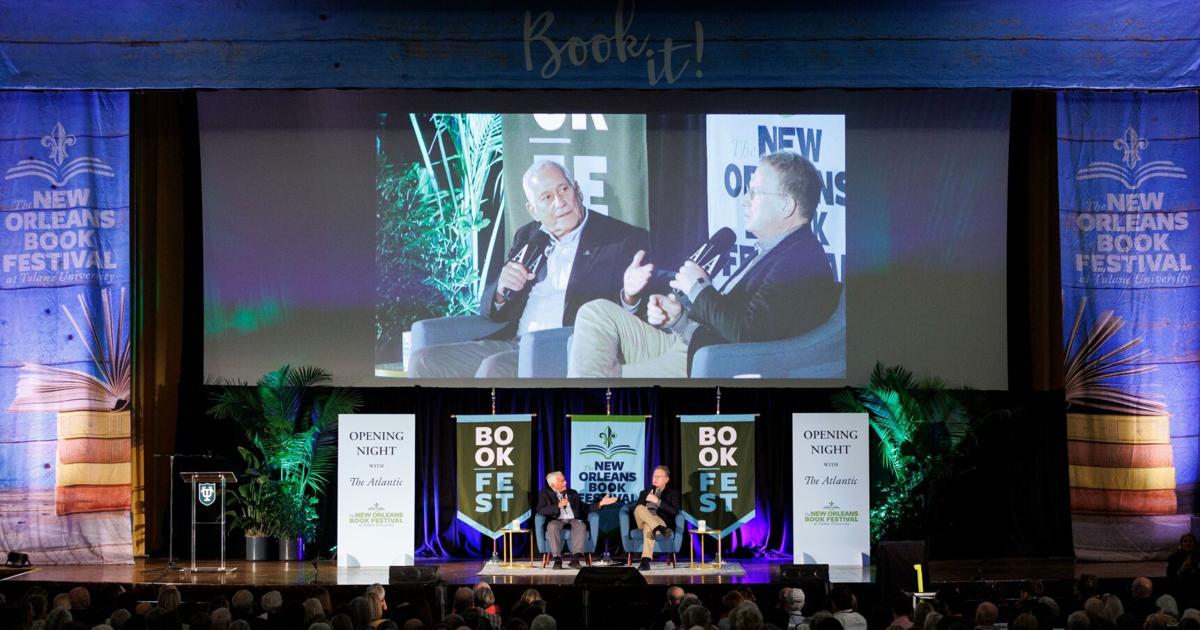
The No. 1 reason The Atlantic magazine wanted to overhaul the list of greatest American novels was simple, editor-in-chief Jeffrey Goldberg said Thursday night: “To start a conversation.”
Challenge accepted.
In a sometimes serious, sometimes jocular discussion at the New Orleans Book Festival at Tulane University, festival co-founder Walter Isaacson took the bait, scoffing at the inclusion of the 1925 F. Scott Fitzgerald novel, “The Great Gatsby.” The Jazz Age classic is “the worst book ever written,” he insisted. “A boring book.”
Goldberg politely declined to defend “Gatsby,” pointing instead to the wide range of viewpoints and cultures represented on the new list, released on Thursday and announced in partnership with the book festival. “We’re big enough, and America is big enough, to take in everything,” he said.
The third annual festival opened in front of an attentive audience that filled Tulane’s McAlister Auditorium. Two days of talks and panels will follow, featuring more than 100 writers, along with food demonstrations, music and a family day.
With up to eight sessions taking place at a time in various lecture halls, classrooms and tents, the celebration of books boasts a festival-like atmosphere among the oaks and azaleas of the Tulane campus.
But it’s dedicated to words and ideas, with observers of politics like Maggie Haberman and Maureen Dowd; business journalists like Michael Lewis, and cutting-edge novelists like Jesmyn Ward and Amor Towles.
A literary checklist
The Atlantic’s great books conversation was made to order for this crowd. As the audience filed into McAlister Auditorium, each received a flyer printed with the list. In front of each title was a tiny box, inviting bookworms to check off the works they’d read.
Unlike many “best novel” lists, The Atlantic’s included a hefty percentage published in the past 10 years: 17 total. It differs from earlier such lists in being more representative of the multicultural United States, Goldberg said.
Introducing the discussion, executive vice president Candace Montgomery of The Atlantic described the many-months-long work as “a Herculean effort of our newsroom, looking at the American project through the lens of literature.”
Old friends from their days founding the Aspen Ideas Festival, Goldberg and Isaacson dwelled briefly on the topic of books, but soon veered off into a discussion that touched on social media, journalism, politics and the way those fields have changed and intersected.
In the early days of Facebook, users welcomed the rapid spread of ideas and information, Goldberg observed. But as falsehoods surged with no time to check facts, the downside of haste became evident. So did the troubling way that anger translates to social media clicks, which he described as “enrage to engage.”
“I don’t think we’d have Donald Trump without social media and digital technology,” he said.
Nuts and bolts
“Instantaneous communication — turns out that is not good for people,” Goldberg said. He expressed optimism for the survival of legacy news publications like The Atlantic, The New York Times and The Washington Post, which, he said, value fact-checking and rigorous editing.
The magazine’s staff members also took the stage to discuss the nuts and bolts of choosing a new list of great books. They decided not to limit themselves to an arbitrary number. “At some point we just got to a place where it felt complete,” said projects editor Ellen Cushing. That point was book No. 136.
Many of the titles on the list will look familiar. Besides the questionable “Great Gatsby,” the list includes “A Farewell to Arms” by Ernest Hemingway, “The Grapes of Wrath” by John Steinbeck, and “The Catcher in the Rye,” by J.D. Salinger.
But there’s also a novel of the Vietnam War from the perspective of a North Vietnamese spy and, eventually, American immigrant, called “The Sympathizer,” by Viet Thanh Nguyen (2015); a story of modern Native Americans, “There There,” by Tommy Orange (2018); and a Hurricane Katrina-era tale of Southern Mississippi by Tulane professor Jesmyn Ward, “Salvage the Bones” (2011).
The unchosen
And then, there’s the question of who was left out.
“The biggest debate people are having so far is the omission of ‘To Kill a Mockingbird,’ ” the 1960 novel of small-town racism by Harper Lee, Cushing said. “We re-examined it and we felt like it just didn’t hold up.” Other novels explore similar topics of justice, duty, family and race in a more sophisticated way, she said. But the staff debated the decision for months.
It would be hard to pinpoint the greatest American novel, said Atlantic staff writer and New Orleans native Clint Smith. “There are so many different strains of Americans,” he said. But with their granular, complex look at the human experience, the best novels can help people understand each other better, he said.
Cushing agreed, alluding to the fraught period after the Civil War when a writer named John Willliam DeForest put forward the idea of a “Great American Novel” that would unite the fractured nation with “the task of painting the American soul.”
“We have so many different kinds of books,” she said. “But together, I think they do paint the soul of America.”
The festival continues through Saturday. All sessions are free and open to the public.
